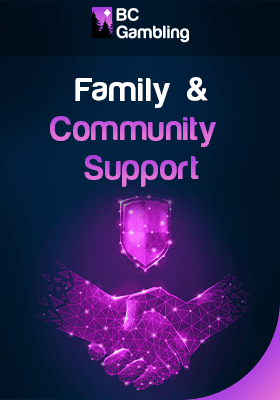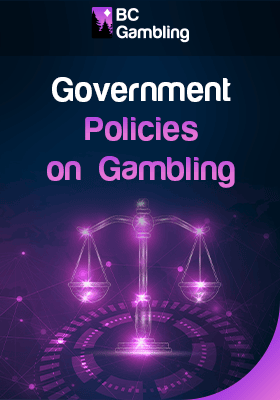Gambling Addiction Prevention in BC: 2025 Support, Warning Signs, and Advice
In British Columbia, gambling addiction emerges as a significant concern, intricately linked to both the individual's mental health and the wider community's well-being. This complex issue, influenced by various factors including the evolution of online casinos and societal attitudes, necessitates a comprehensive understanding and a multifaceted approach. British Colombia commitment to gambling addiction prevention is reflected in its extensive array of resources and support systems, aiming not only to address the addiction itself but also its broader impact on families, workplaces, and society at large.

Understanding Gambling Addiction in BC
Gambling addiction, a pressing issue in British Columbia, affects numerous individuals across the province. Understanding this complex condition is crucial for fostering a culture of Responsible Gambling and addressing its impact on mental health and well-being.

The Science Behind Addiction
Understanding gambling addiction begins with its neurological basis in the brain's reward system, where behaviors linked to survival, like eating, trigger dopamine release. Addictive behaviors, including gambling, can produce an exaggerated dopamine response. This leads to tolerance, requiring increased engagement in the behavior to achieve the same satisfaction. This pattern forms the basis of gambling addiction, necessitating comprehensive treatment and prevention efforts.

Identifying Early Warning Signs
Key indicators of problem gambling include loss of control, workplace issues, preoccupation with gambling, increased betting amounts, relationship struggles, secretive behavior, legal or ethical problems, and denial. Physical symptoms such as anxiety and stress-related issues may also be present. Recognizing these signs early is crucial for effective intervention in BC.

Impact of Gambling on Mental Health
There is a significant interplay between gambling addiction and mental health. Many individuals with gambling problems also face mental health disorders, either as a pre-existing condition or as a result of their gambling behavior. This addiction can intensify existing mental health issues or lead to new disorders, creating a complex cycle that necessitates a comprehensive approach to prevention and treatment in BC.

The Scope of Gambling Addiction in BC
In British Columbia, gambling is a widespread activity, but it also leads to addiction for some. This issue requires a balance between providing entertainment and addressing addiction. Understanding the extent and nature of gambling addiction is vital for maintaining responsible gaming practices in BC.
Gambling Addiction Statistics in BC
In British Columbia, gambling is an activity predominantly pursued for entertainment, with the majority of participants engaging in it responsibly. Despite this, it's important to acknowledge that gambling issues persist within a subset of the population. According to the 2014 Problem Gambling Prevalence Study, there has been a slight decline in the number of problem gamblers from 4.6% of the population in 2008 to 3.3% in 2014. Notably, young adults between the ages of 18 to 24 exhibit a higher inclination towards problematic gambling, with 7.3% being identified as problem gamblers and 18.4% considered at-risk.
Types of Gambling Activities Associated with Addiction
Particular forms of gambling are more often linked to addiction:
- Casino games (blackjack, poker, roulette)
- Slot machines
- Sports betting
- Online gambling
- Bingo and scratch cards
Demographic Groups Affected
A moderate 7.9% of adults in B.C. fall into the low-risk gambling category, experiencing minimal to no negative impacts from their gambling habits. Encouragingly, an estimated 88.8% of the population are classified as non-problem gamblers or have not gambled at all in the year preceding the survey. Despite these figures, the prevalence of gambling in B.C. has remained consistent since 2008, with 72.5% of adults participating in some form of gambling.
The diversity of gambling activities has increased over time, particularly in the lottery sector, which saw a 23% rise in participation. Overall, 81.6% of survey respondents reported playing lotteries. It's also observed that individuals with higher incomes tend to engage more in gambling activities. This data underscores the importance of maintaining and enhancing responsible gambling programs to ensure the well-being of all British Columbians who choose to gamble.
Vulnerable Populations
Certain groups are more susceptible to gambling addiction:
- Youth: Approximately 5% of teenagers show compulsive gambling tendencies.
- Seniors: About 70% of adults over 60 gamble annually, with 2% at risk of addiction.
- Low-Income Individuals: Financial struggles can increase the risk of addiction.
Impact on BC Communities
The effects of gambling addiction are felt throughout BC:
- Families and Workplaces: Financial loss, domestic issues, and decreased productivity are common consequences.
- Societal Costs: Challenges include child neglect, unemployment, and crime, with an estimated annual cost of $7 billion.
- Economic Burden: The hidden costs of gambling create a substantial burden, highlighting the need for effective support and prevention.
Addressing gambling addiction in BC involves understanding its prevalence, affected demographics, and societal impact. Efforts toward Responsible Gaming must continually adapt to protect the community's welfare and integrity.

Education and Awareness in BC about Gambling Addiction
British Columbia prioritizes education and awareness to address the growing concern of gambling addiction. Diverse strategies are employed to create a culture of responsible gaming, especially among young people, and to mitigate the risks of addiction.
Community Outreach Programs
Community outreach is key in BC's approach to preventing gambling addiction:
- BetStopper: Software that blocks online gaming sites, aiding parents in protecting their children.
- Parents as Partners: A campaign highlighting that lottery tickets should not be gifts for minors.
- International Centre for Youth Gambling: A research body that informs gaming industry practices.
These programs, vital in reaching vulnerable groups, demonstrate the commitment to curbing gambling addiction in BC.
School-Based Initiatives
Schools in BC play a proactive role in educating students about gambling:
- KnowDice: An educational program for grade six students focusing on gambling risks.
- GAME BRAiN: An interactive game show educating Ontario students, funded by the Ministry of Health and Long-Term Care.
- Stage Performances: Plays like 82% and R U Up? illustrate the real-world impacts of gambling.
Public Service Campaigns
Public service campaigns are integral to addressing gambling addiction:
- The Office of Problem Gambling (OPG): Engages in awareness, prevention, training, and research.
Collaborative efforts enhance the impact of these campaigns, ensuring a well-rounded approach in BC.

Responsible Gambling Practices in BC
British Columbia emphasizes responsible gambling to help individuals control their gaming habits. This section discusses key practices like setting limits, self-exclusion, and using support tools.
Setting Limits and Budgeting
Effective management of betting funds is critical:
Bankroll Management
Bankroll Management involves managing funds dedicated to betting. It includes tracking wins and losses and establishing a staking plan. Common strategies include:
- Fixed Unit Model: Betting a consistent amount, offering simplicity but lacking flexibility.
- Percentage Model: Betting a fixed percentage of the bankroll, adapting to changes in bankroll size.
- Potential Return Model: Stakes based on potential returns, considering odds and perceived value but higher risk.
- Confidence Model: Adjusting stakes based on confidence level in bets, though prone to emotional bias.
Time and Spending Limits
Setting time and spending limits, along with Reality Checks, helps maintain balance and prevent excessive gaming. Canadian sportsbooks often support setting deposit and loss limits.
Self-Exclusion Policies
Self-exclusion policies assist individuals in managing their gambling habits:
- Voluntary Self-Exclusion: A tool for those struggling with gambling, allowing them to ban themselves from gaming facilities or platforms for a certain period.
- Effectiveness: It provides a break from gambling, encouraging seeking help and engaging in alternative activities.
Using Gambling Support Tools
Support tools aid in responsible gambling:
- Deposit and loss limits to control spending.
- Time limits and session reminders to manage gaming time.
These tools, including reality checks, are designed for a balanced gambling approach.
Responsible gambling in BC combines various strategies and tools for a controlled approach to gaming, ensuring a safe and enjoyable experience for all participants.
Support and Counseling for Gmabling Addiction in British Columbia
For those facing gambling disorder in British Columbia, understanding and accessing available support is crucial. This section outlines support options, including helplines, support groups, and counseling services.
Helplines and Hotlines
Immediate support is vital for individuals with gambling disorders:
- BC's Gambling Support Line: A 24/7 toll-free service at 1-888-795-6111 offering confidential assistance.
- ConnexOntario: A 24/7 helpline for residents outside BC, available at 1-866-531-2600, with multilingual support.
- National Helpline: A potential national helpline could provide unified support across Canada.
These helplines offer immediate, accessible support for diverse communities in BC.
Support Groups for Addicted Gamblers
Support groups are crucial in the recovery journey:
- Gamblers Anonymous in BC: Offers group support meetings to share experiences and support recovery.
- Peer Support: Encourages shared experiences, rebuilding self-esteem, and reducing relapse rates.
- Discovery Program: A multi-day treatment program focusing on skill-building and recovery in a group setting.
These groups have proven effective in aiding recovery from gambling addiction in BC.
Individual Counseling and Therapy
Personalized counseling and therapy are key to treating gambling addiction:
- Clinical Counselling: Gambling Support BC offers multilingual individual, group, and family counseling services.
- Cognitive Behavioral Therapy (CBT): Aims to change thoughts and behaviors related to gambling.
- Motivational Enhancement/Interviewing: Focuses on enhancing motivation for change.
- Guided Self-help Interventions: Includes self-guided activities, often with professional guidance.

Family and Social Interventions for Gambling Addiction
Gambling addiction impacts not just the individual, but also families and communities. Addressing it effectively requires strategies that involve both individual treatment and family and social interventions.
Involving Family in Recovery Process
Family involvement is critical in the recovery of addicted gamblers, providing essential support and understanding.
- Family Support: Family support can significantly improve treatment outcomes by offering understanding and encouragement.
- Role of Family in Therapy: Family therapy educates and heals, helping families learn how to support their loved one during recovery.
- Effectiveness in BC: While specific success rates in BC may be limited, family participation in treatment is recognized as beneficial.
Strengthening Support Networks
Building robust support networks is key to recovery:
- Social Support: Support from family, friends, and the community is invaluable for coping with gambling-related issues.
- Community's Role: Community programs like Gamblers Anonymous provide spaces for shared experiences and guidance.
Addressing Enabling Behaviors
Enabling behaviors that unintentionally support addiction must be recognized and addressed.
- Identifying Enabling Behaviors: Actions like lending money or covering debts can unintentionally support addiction.
- Avoiding Enabling: Strategies include tracking spending, managing finances, and seeking legal advice to protect assets.
- Prevalence in BC: Efforts in BC focus on breaking the enabling cycle and empowering individuals to maintain financial stability.

BC Government Regulations and Policies
British Columbia's approach to gambling focuses on balancing entertainment and economic benefits with responsible gaming and harm reduction. The province has established laws, governing bodies, and industry collaborations to ensure ethical and legal gambling practices.
Overview of BC's Gambling Laws
BC's gambling laws, overseen by specific bodies, aim to maintain the integrity of gambling activities:
- The Gaming Policy and Enforcement Branch (GPEB) ensures the proper functioning of the gambling industry, managing provincial responsible gambling programs under the Gaming Control Act, Regulations, and Canada's Criminal Code.
- The British Columbia Lottery Corporation (BCLC) manages lotteries, casinos, and commercial bingo halls.
Key aspects of these laws include legal gambling forms, consumer protection, and government gaming policies, all contributing to responsible gaming and addiction prevention.
Effectiveness of Harm Reduction Strategies
BC's harm reduction measures aim to minimize gambling-related harm:
- Collaborative teams focus on public health and policies for responsible gambling.
- New gambling offerings, like PlayNow.com, require government approval, aligning with harm reduction objectives.
- Strategic actions by Ministries of Health and Finance, along with BCLC, maintain policy dialogues aligning with public health risks.
Collaborative approaches between public health, governmental bodies, and casino operators are showing positive trends in reducing problem gambling rates in BC.
Collaborations with the Gaming Industry
Partnerships between the government and the gaming industry are crucial in preventing gambling addiction:
- Partnerships and agreements follow requirements of trade agreements and the Gaming Control Act, outlining vendor requirements.
- Collaborative efforts ensure alignment with best practices and understanding of the social and economic implications of gambling.

How Online Gambling has Influenced Gambling Addiction
Online gambling has significantly transformed the gaming industry, making it more accessible and engaging. However, this growth presents challenges, particularly regarding addiction risks and the impact on young people. This section examines addiction rates, technological prevention tools, and responsible gaming measures like age verification in the context of online gambling.
Impact of Online Gambling on Addiction Rates
Online gambling has heightened concerns about addiction rates, especially among youth. A 2018 Canadian survey showed that nearly two-thirds of adolescents engaged in gambling activities in the previous year. Early engagement in gambling is linked to increased risks of addiction and psychological distress. The rise of online casinos and sports betting correlates with higher problem gambling rates, necessitating resources like the Gambling Helpline in BC.
Technological Tools for Prevention
Technological advancements in online betting offer tools for addiction prevention. Online platforms provide features like self-limitation and self-exclusion to foster responsible gaming. For example, Gamingtec's API includes self-exclusion and limits on bets, losses, and sessions. The effectiveness of these tools depends on their implementation by operators, with data on their usage and success in BC being vital for understanding their impact.
Age Verification and Responsible Gambling Online
Age verification is critical in preventing underage access to online gambling, maintaining ethical standards, and ensuring legal compliance. Implementing age ID verification is crucial for preventing underage gaming and combating fraud. Age verification also aligns with customer safety and legal compliance, playing a role in responsible gaming. Data on underage gaming prevalence and the efficacy of age verification in BC are important considerations for the industry.
Online gambling, beyond being entertainment, involves navigating complex issues like addiction and underage participation. Technology presents both challenges and solutions. Emphasizing responsible gaming measures such as protecting vulnerable gamblers, preventing underage gambling, and ethical marketing is essential for providing a secure and enjoyable experience for all players.
Supportive Resources for Gambling Addiction in BC
In British Columbia (BC), a comprehensive support system is available for individuals dealing with gambling addiction. This system includes specialized treatment centers, government-funded programs, and contributions from charitable organizations and NGOs.
Addiction Treatment Centers
In BC, several addiction treatment centers focus on gambling addiction, offering tailored programs and therapies. These include:
-
Cedars at Cobble Hill
Cedars at Cobble Hill, situated in a tranquil natural setting, offers holistic treatment programs for gambling addiction, encompassing individual and group therapy.
-
Sunshine Coast Health Centre
This men-only center in Powell River provides non-12-Step treatment for gambling addiction, integrating therapies like EMDR, CBT, and DBT, and amenities for physical activities.
These centers apply various approaches, from traditional to contemporary therapies, catering to diverse needs.
Government-Funded Support Services
The BC government's Responsible Gambling Strategy, established in 2003, includes public awareness, treatment, prevention, and research. Key initiatives include the Gambling Support BC Program, offering free counselling, and the Problem Gambling Helpline in BC for immediate support.
Charitable Organizations and NGOs
Charitable organizations and NGOs play a significant role in supporting those struggling with gambling addiction in BC. They provide a range of services like counselling, therapy, and support groups. Notable charities and NGOs active in 2023 include:
- International Problem Gambling Center
- GamCare
- BeGambleAware
- Stop Predatory Gambling Foundation
- National Council on Problem Gambling
- Delaware Council on Gambling Problems
- New Mexico Council on Problem Gambler
- Young Gamers and Gamblers Education Trust (YGAM)
Addressing Gambling Addiction and Co-Occurring Disorders
In British Columbia, co-occurring disorders, such as gambling addiction alongside mental health issues or substance abuse, present a complex challenge requiring a nuanced approach to treatment.
Understanding Dual Diagnosis
Recognizing the interplay between gambling addiction and co-occurring disorders is essential. These disorders often overlap, complicating diagnosis and treatment. Addressing each condition individually is vital for effective recovery.
- Link Between Gambling Addiction and Co-Occurring Disorders: Gambling addiction often coexists with mental health disorders like depression or anxiety. This relationship can stem from pre-existing mental health issues or develop as a consequence of gambling.
- Challenges in Dual Diagnosis: Treating dual-diagnosis cases is complex. Untreated co-occurring disorders can lead to relapse, highlighting the need for comprehensive treatment strategies.
Integrated Treatment Approaches
Integrated treatment models offer comprehensive care for individuals with co-occurring disorders, addressing both addiction and mental health simultaneously.
- Benefits of Integrated Treatment: This approach ensures a holistic view, addressing the interconnected nature of dual diagnosis, leading to more effective treatment.
- Interdisciplinary Team Roles: Collaborative care from various disciplines results in better patient outcomes, essential for treating complex co-occurring disorders.
Challenges and Solutions
Tackling co-occurring disorders involves various challenges and requires strategic responses.
- Barriers to Treatment: Treatment barriers include both personal and structural challenges. Overcoming these requires adaptable, patient-centered approaches.
- Improvement Strategies: E-Health, Technology-based Interventions, and research-supported modalities like CBT and DBT are effective in overcoming treatment barriers.
Conclusion:
In summary, British Columbia's approach to tackling gambling addiction is comprehensive and multi-faceted. The province's strategy includes educational initiatives, responsible gaming measures, extensive support services, and a focus on co-occurring disorders. These efforts showcase BC's commitment to addressing the complexities of gambling addiction. The emphasis on both prevention and intervention underlines the province's dedication to the health and well-being of its citizens. BC's integrated approach stands as a model for responsible gaming and community welfare, reflecting a united stand against gambling addiction's challenges.
FAQ
- What are the main signs of gambling addiction? The main signs include uncontrollable impulsive gambling thoughts, excessive playing time, pathological lying for finances, changing personality or behaviour, feeling 'high' when playing, and possibly engaging in illegal activities.
- What is being done in BC to prevent gambling addiction? In BC, efforts focus on integrated treatment models, interdisciplinary care approaches, and various community and government initiatives emphasizing education, prevention, and recovery.
- How effective are BC's current prevention programs against betting disorder? Integrating treatment for co-occurring disorders, emphasizing interdisciplinary approaches, and implementing evidence-based practices show promising results in BC.
- What support resources are available for people with gambling addiction in BC? Various resources in BC, including helplines, community outreach programs, and specialized treatment facilities, are designed to support those struggling with gambling addiction.
- What are the future strategies for preventing gambling addiction in BC? The future strategies include enhancing integrated treatment modalities, leveraging technology-based interventions, promoting community-centred approaches, and strengthening collaboration among various stakeholders to foster a holistic approach toward preventing and treating gambling addiction in BC.